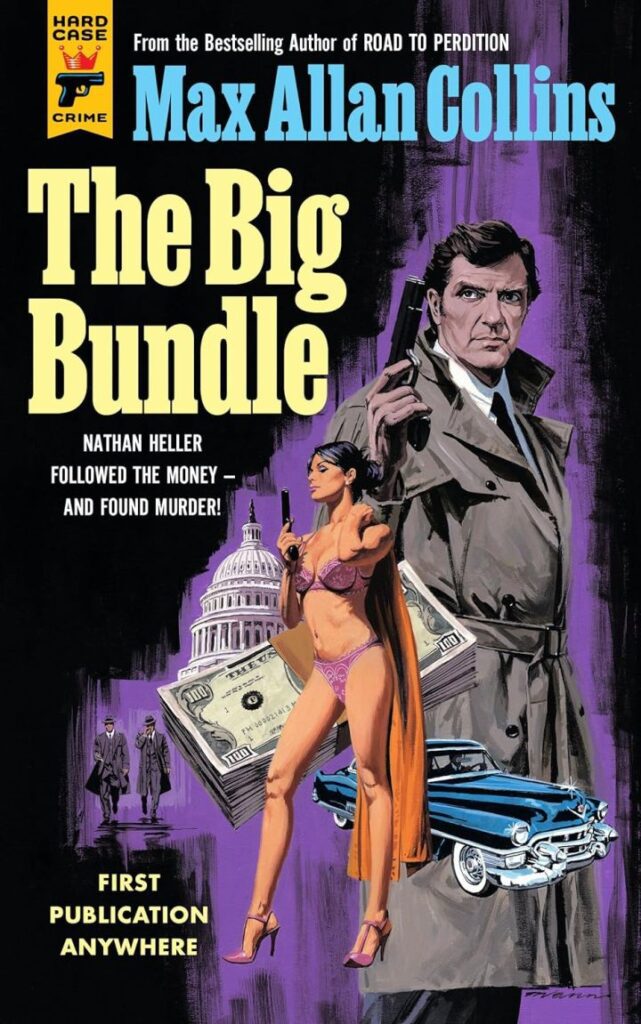
Private-detective books are great fun. They have the rock-solid dramatic structure of the cop solving a crime, with the added dimension that the crime-solver is not inside the system. He’s the scrappy outsider, armed mostly with his wits and guts. The cops are the pulverizing fist of the state. The private detective is a well-placed stiletto. The only problem is he is as much a fantasy figure as a superhero. Private detectives do credit checks. They follow cheating spouses. They check out insurance claims. They don’t solve murders, which are the only real crimes worth writing stories about. But Max Allan Collins wanted to write private-detective novels.
Buy The Big Bundle by Max Allan CollinsMax Allan Collins is best known in the cinema world for the adaptation of his graphic novel Road to Perdition. For 15 years, he was also the writer of the Dick Tracy comic strip. But he has also been a long-time mystery and crime-thriller novelist, with several series characters. His longest running series stars the detective Nathan Heller.
Nathan Heller is Collins’ private detective, and Max Allan Collins gets around the private-detective fantasy problem in two ways. First, Nathan is an ex-cop who has direct ties with organized crime, even if he doesn’t want them. So that makes his involvement in dicier crimes more plausible. Second, Heller lives in the past. This series is as much historical fiction as it is crime stories, beginning in the early ’30s. Many of the characters and crimes Heller deals with are the real thing. The attempted assassination of FDR in Florida, Dillinger’s death, the kidnapping of the Lindbergh baby, Nathan Heller somehow gets shoved into them all. He was even on site for the murder of Sir Henry Oakes, the subject of our recently reviewed Nicholas Roeg movie, Eureka.
In The Big Bundle, the true crime is one mostly forgotten. Bobby Greenlease Jr. was the son of a major Cadillac dealer in Kansas City, Missouri. In 1953, a woman came to his Catholic school, and took Bobby away on a pretense. The kidnappers later demanded $600,000, the largest ransom in American history to that point.
Nathan Heller is called in and supervises the ransom drop. He wants to stick with the money, but it’s not his call. The money is delivered… but the child is not. Heller essentially goes undercover (under his own name) to connect with the local criminals. They’re impressed with his mob-tied reputation, and eventually connect him with Carl Hall. He doesn’t use his real name, at first, but he’s been boozing and whoring around town, carrying some heavy luggage that he occasionally extracts bills from.
Heller’s main source of information is a connected cab company, essentially a brothel on wheels, and a crooked cop. He gets Carl too confess, and the cops swoop in… But only half of the ransom is recovered.
That’s the first half of the novel. The rest is about what happened to that money. Years later, Heller is working as an investigator for Bobby Kennedy whose Senate committee is investigating the connection between labor unions and organized crime. Jimmy Hoffa is the main target… and somehow becomes Heller’s client as well. Kennedy, Hoffa, and an anonymous third client all want to hire Heller to go back over the old case and find out what happened to that old money.
The Nate Heller books are an interesting mélange of hard-boiled crime and historical fiction. In every one, Collins makes it clear that he’s being as accurate as possible… while giving himself free license to make the story as interesting as possible, blending fiction and fact. And his sense of drama tends to lean towards the conspiracy theory of history: that events unfold because of the deliberate actions of powerful individuals.
As history, it’s debatable. As mystery fiction, it’s engaging. Collins deftly mixes tough action with precisely researched historical detail. Every mid-century dive bar and crummy hotel feels accurately observed. There’s enough detail for flavor, and a literary flair to the writing that’s interwoven with Heller’s Chicago smart-ass attitude.
These are essentially historical-fiction novels, so a quick glance at Wikipedia could spoil the ending (though Collins always blends in enough fiction to include conspiratorial surprises). The Big Bundle is set in the ’50s, where Nate Heller is getting on in years and isn’t as dynamic as when he was running with Babyface Nelson or Bugsy Siegel. He’s still a smart ass who doesn’t keep his mouth from running for anyone, not a senator nor a gangster. He’s a good character, with enough moral grayness to keep him interesting. What’s constantly impressive in the series is the clear attempt to give historical figures their due and try to understand them in the context of their times.
I love the Nathan Heller books. They feel like they were written with my particular interests in mind: a private detective at the center of all the major historical crimes of the 20th century. And because they are centered around historical events, and not Nate Heller’s personal narrative, any one of them can be a reasonable starting point. The Big Bundle suffers a little from being a more obscure crime, not necessarily one with a pre-built-in audience. But it has the deft combination of hard action, clever detective work, and the sheer fun of historical big-deals being interacted with by a smart-ass detective who does not take them too seriously that makes the series so rewarding.
The Big Bundle by Max Allan Collins has been released in hardcover and paperback by Hard Case Crime.